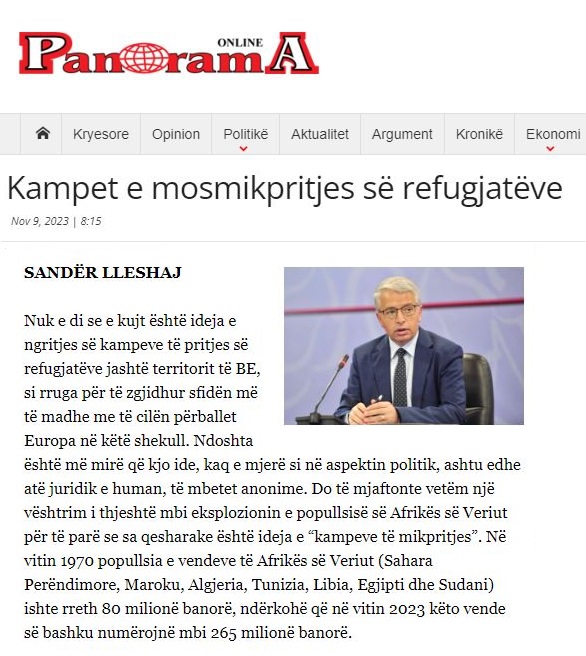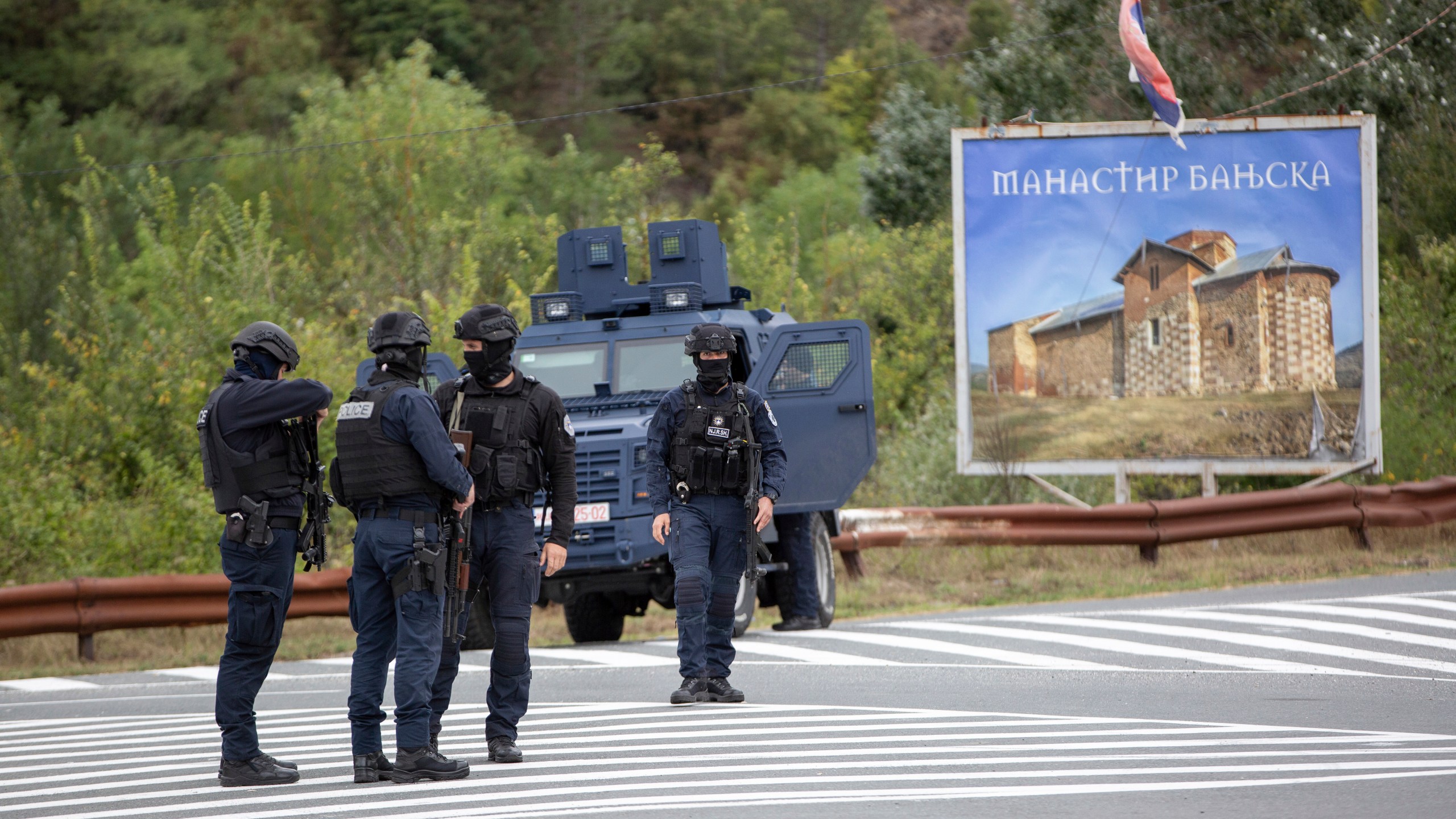The agreement to send illegal immigrants from Italy to Lezha, signed by the Albanian Prime Minister Edi Rama and the Italian counterpart Giorgia Meloni, sparked debates and concerns among citizens. In the absence of compelling information, media became the arena of clash of baseless theses, discriminatory language and of the spread of panic among citizens. These theses were identified not only in Albania, the receiving country of immigrants, but also in its neighboring countries, such as Montenegro.
What is happening with the agreement?
One day before the majority in parliament would vote on the agreement that Prime Minister Edi Rama signed with his Italian counterpart Giorgia Meloni, regarding the treatment of illegal immigrants from Italy on Albanian Land, the Constitutional Court of Albania decided to suspend such agreement.
The agreement sets out that Albania shall provide Italy with the opportunity to use Albanian territory to establish, at its own expense and under its jurisdiction, two centers for the administration of 36,000 male immigrants per year.
Thirty opposition Member of Parliament, led by Sali Berisha and Gazment Bardhi, appealed the agreement to the Constitutional Court. They claim that the state procedure of negotiation and signing has not been followed, as the prior authorization from the President of the Republic has been avoided.
At the same time, MPs requested the suspension of the parliamentary vote on the agreement, scheduled for December 14th.
The Constitutional Court decided to accept the review of this case submitted by opposition MPs and scheduled January 18th, 2024, as the proceedings date. At the same time, the Constitutional Court suspended the scheduled vote on the agreement during the plenary session on December 14th.
Opposition voices against the agreement began to surface immediately after its signing by the leaders of the two governments on November 6th. Albanian citizens became aware of such agreement and its signing through a video initially published by Prime Minister Meloni and re-shared later by Prime Minister Edi Rama in his Instagram page, in the Italian language.
“Italy and Albania today signed an important memorandum of understanding aimed at combating human trafficking and preventing irregular migration flows. A historic agreement for which I want to thank Prime Minister Edi Rama and the entire Albanian government!” – was written in the post.
The signed protocol had not yet been made public.
Official reactions
The government published the text of the signed agreement on its website, one day later, on November 7th. Despite the disclosure of the protocol, many aspects of how these immigrant centers will work and the security of the surrounding area are still unclear to this day.
Opposition of Sali Berisha called the agreement unconstitutional, claiming that it encourages xenophobia and violates the Constitution and the European Convention of Human Rights.
Amnesty International’s reaction was in line with that of the opposition, calling the agreement illegal, unenforceable and that it should be abolished“.
The European Union, through a spokesperson for the European Commission told reporters that they are in touch with Italian authorities, from whom they have requested details regarding the immigration agreement with Albania.
We need to know what it contains before commenting.” – stated the spokesperson for the European Commission, implying that the Union was not aware of its details.
Media coverage
Due to the lack information and details about the agreement, the media also found themselves in a challenging position. Some addressed to experts and international figures to assess various aspects of the situation.

| The agreement to be the backyard of Italy.
|

| Rama-Meloni Agreement, experts: EU countries should support it! Reactions in Germany |

| “Rama-Meloni” Agreement, Gjipali: Albania’s role is minimal. Main obligations are on Italy! |

| Rama-Meloni Agreement/Italian Expert: My opinion is entirely negative… Albania, a parking lot |
Lack of sufficient information to judge is a fact agreed upon by all experts.
Among them, Former Interior Minister, Sander Lleshaj, in an article published in media, considers the agreement a poor political and humanitarian move, as well as a threat to the country’s security.

“The absurd idea of reception centers,’ which are actually conceived as fully-fledged pre-detention camps, only proves the political and intellectual impotence of those responsible for finding solutions. These camps are intended to be established outside EU territory, to essentially be also outside the law, as European constitutions and legislation do not allow the development of procedures that are thought to be applied in camps outside the territory of member countries.” – Former Interior Minister, Lleshaj, wrote.
Other media outlets used this lack of information to spread theses inciting hate speech and panic amongst citizens.
The narratives about the agreement
There were two main theses raised, in Albania, regarding the uncertainty incited by the agreement known as Rama-Meloni.
The first thesis was the recurring one about “depopulation of Albania”. According to conspiracy theorist Akil Pano: ‘In the last 10 years, we see that one million Albanians have left our country.’ While the country is depopulated, there is an agenda; the moment will come when it will be populated”.

| 36 thousand Africans in Shëngjin, Pano: It’s a depopulation agenda; we will be replaced |
At the same time, there were media outlets drawing parallels between what is expected to happen in Albania and situations already occurring in refugee camps in Italy. The article posed the question of whether Lezha could become the next Lampedusa, concerning citizens, especially those from Lezha.
Lampedusa, one of Italy’s islands where asylum seekers who enter illegally are housed, faced 11,000 asylum seekers within four days in September, almost twice the number of resident inhabitants.
In other cases, the media used statements from the Italian Prime Minister, paraphrasing them not faithfully and intending to arouse fear among readers.
Among the refugees we will bring to Albania, there may also be terrorists – writes the headline of the article.

| Meloni for Il Messaggero: There may also be terrorists among refugees we will bring to Albania |
Actually, the Italian Prime Minister said ‘ the equation between irregular immigration and terrorism is incorrect, but there is no doubt that a broader context of lawlessness can become a breeding ground for criminal, even terrorist organizations“.
Such concern was also manifested in Lezha streets where citizens protested against the agreement.

| “Do not turn Lezha into Lampedusa” / Citizens protest against Rama-Meloni agreement for immigrants |
Another form of reaction was through uncontrolled satire or humor, using discriminatory and racist language.

| First refugees after Rama-Meloni agreement learning the lyrics of the song: ‘Mora Fjalë”! |
Among them, the post of Lezha Mayor, Pjerin Ndreu, stood out, who called for the election of the ‘most beautiful meme’ for this case addressing the concerns of Lezha citizens without the seriousness of an official.

All this narrative did not help clarify the agreement; on the contrary, it went beyond the borders of the two directly involved states.
The region is ‘concerned’
An article published in Montenegro raised questions about the security of this state, precisely due to the agreement between Albania and Italy.
Italian ‘GUANTANAMO’ with immigrants in Albania: A THREAT to the security of Montenegro?

The article in question claimed that the agreement increases the risk of crimes in Montenegro because it’s not known through which route will immigrants treated in Albania seek a better life in the EU, of which Albania is not a part of‘. Another portal, this time in Serbia, raised questions about the agreement, calling it in line with the ‘goals of the Open Balkan project initiated by Aleksandar Vučić and funded by George Soros.’

The issue has been used as rhetoric in Serbia, fueled by election campaigns preceding the December 17th elections.
One of the theses raised about this agreement is articulated by Sasa Borojević, a Serbian analyst who declared in an interview that the immigrants Italy will bring to Albania will be transferred to Kosovo. The interview was later shared on Facebook with captions: MIGRANTS WILL BE TRANSFERRED TO KOSOVO (no one is talking about this).

The above narratives have been debunked as baseless by Raskrinkavanje, the fact-checking media in Montenegro.
Conclusion
The decision of the Constitutional Court in Albania to suspend the vote on the Rama-Meloni agreement in Parliament until its final decision, expected no earlier than 2024, seems to have deflated the belief that the agreement will indeed be implemented.
The information provided so far from the signed protocol between the Albanian and Italian governments does not provide a clear picture of what the two Prime Ministers have agreed upon. This has led to various baseless theses spreading hate speech against immigrants, racism, and panic among citizens in Albania, especially in Lezha, the city where the reception centers are planned to be established.
In addition to the concerns raised by the public in Albania regarding public and national security, since November, when the two Prime Ministers announced their decision, numerous baseless theses have emerged in Albania and in other countries in the region. These theses lack factual or official information, adding more confusion to the citizens directly affected by the decision.






